The JICA EWARS Project (Project for Strengthening Capacity for Early Warning and Response to Infection Diseases) conducted its 2nd Country-Focused Training in Japan
2024.09.25
The training, which took place from 2 to 22 June 2024, aimed to develop surveillance and emergency response capacity at Indonesia's national and subnational levels. Five participants were from the Ministry of Health, while the remaining five were from subnational public health sectors, such as provincial or district health offices, in the project’s target provinces (Banten, East Kalimantan, and South Sulawesi). They visited Tokyo, Mie, and Hiroshima prefectures to study about infectious disease surveillance systems in Japan. At the end of the training, all participants presented future action plans that they would implement at their facilities to strengthen the surveillance, making use of what they had learned over the previous three weeks.
In Tokyo, participants received lectures on several national perspective by experts from the National Institute of Infectious Diseases (NIID). They also learned about subnational-level surveillance systems and relevant operations from experts at Mie and Hiroshima facilities, including prefectural health offices, public health centers, national and municipal hospitals, public and private laboratories, and universities. Participants raised several questions, and lively interactive discussions were held throughout the training program.
The main objectives of this training are to study the concept of infectious disease surveillance, identify the strengths and challenges of the current system, and think about a future vision of surveillance, while taking into account the differences between Japan and Indonesia.
The training was ended successfully, thanks to the thoughtful support from the NIID and many other facilities. The Indonesian participants were really satisfied and eager to continue the training program. We are confident that the training program will contribute to develop future collaboration between Indonesian and Japanese experts, providing precious opportunity to learn from one another and address the global issue of infectious diseases together.
Here is the participants’ feedback:
Name: Nurul Muhafilah (Filah)
Position: Health Administrator in Malaria Working Team, Directorate of Communicable Disease Prevention and Control, Ministry of Health, Republic of Indonesia
Before the training I had limited knowledge about EWARS. However, after this training, I gained a comprehensive understanding not only of EWARS but also of surveillance, recording, and reporting systems, including insights into EWARS in both Japan and Indonesia.
I felt insecure because I was the youngest and perhaps the least experienced participant, especially since the other participants were seniors with direct experience in EWARS. However, as the training progressed, these concerns were alleviated because the other participants were friendly and cooperative, making the differences in age and experience insignificant.
I thought the environment would be formal and rigid, given the qualifications of the instructors, many of whom were professors. However, the training turned out to be engaging, informative, and open, with instructors who were friendly, humble, and open to discussion.
I expected a standard learning method with presentations and Q&A sessions, focusing on sharing experiences between countries and participants. However, the training included many group discussions and practical exercises that could be applied in our work environments. For instance, at Hiroshima University, there was a surprise workshop involving group discussions and presentations. Honestly, this session was a bit surprising because it was different from the teaching methods used on previous days. However, it was exciting and very valuable because it provided new knowledge and insights.
After completing the training, the following were some of the things that I thought would be useful in my future work:
1.
Enhancing Cross-Program Collaboration with the Surveillance Working Team: This includes coordinating updates and confirming malaria outbreak data, and jointly managing the outbreaks. One initiative is the creation of a shared WhatsApp group. Currently, this group is actively used, and the Surveillance Working Team is involved in handling malaria outbreaks.
2. Preparation for Emerging Diseases: Drawing lessons from the training in Hiroshima, there is a clear emphasis on being prepared for potential future diseases. Plasmodium knowlesi malaria, while not currently a significant issue in Indonesia, poses a potential threat, particularly as neighboring Malaysia faces challenges with this disease. The plan to develop surveillance guidelines for P. knowlesi malaria is a proactive measure to enhance readiness and response capabilities.
3. One Health Approach with Cross-Sector Collaboration: The implementation of the One Health approach, which promotes collaboration across various sectors and programs, is crucial in managing malaria outbreaks, especially in hard-to-reach areas. Therefore, after the training we organized a cross-sector and cross-program meeting highlighting the commitment to engage multiple stakeholders, including representatives from multiple ministries and agencies. This comprehensive approach helps to leverage resources and expertise, ensuring a more effective and holistic response to the challenges towards malaria elimination.
Other things I am impressed to learn that Japan has made significant advances in addressing that I would like to mention are as follows:
1. Antimicrobial Resistance (AMR), showing a stark contrast with Indonesia in disease control.
2. Japan's centralized notification and medical record-keeping processes, supported by laboratory results, including PCR tests.
3. The cross-sectoral collaboration and integrated programs at CDC Hiroshima(CDC: Centers for Disease Control and Prevention) , which I hope can be adopted in Indonesia in the future.
Also, I am fascinated by the existence of a parasitology museum in Japan that is open to the public for free and easily accessible, helping to educate the public about various infectious diseases and developments in Japan.
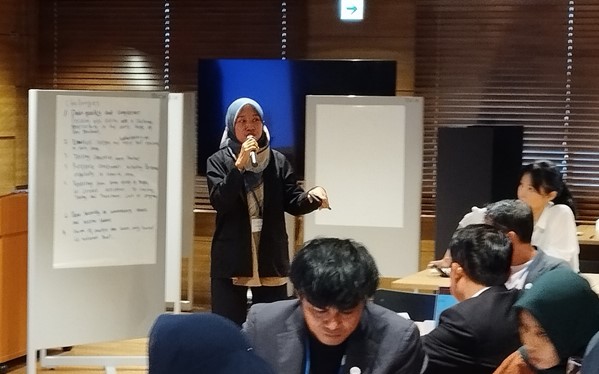
Ms. Filah’s presentation of the results of a group discussion during a workshop at Hiroshima University (June 18, 2024).
Name: Hasan Rahim
Position: Head of Disease Prevention and Control, Health Office of Maros District, South Sulawesi
I am one of the applicants selected to participate in the Developing Early Detection and Response Capacity to Infectious Disease Outbreak (EWARS) training.
This training was very helpful and supported me in carrying out my duties and functions, especially in managing early detection and response efforts for infectious diseases in my capacity as Head of the Disease Control and Prevention Division. The 21-day training program started at TIC (Tokyo International Center) in JICA Tokyo, which was very enjoyable, conducive, and applicable. TIC has very comfortable facilities and the interaction between visitors with very communicative and interactive staff. The combination of concepts and practice through field visits made us better understand how laboratory-based disease surveillance is implemented in Japan. Everything is an extraordinary lesson for us, and this will become capital for carrying out our duties in the future in our district.
Apart from that, we also had the opportunity to see the social and cultural aspects of Japanese society, which are very interesting, clean, disciplined, caring, and respectful of other people's rights. On the other hand, we had the opportunity to visit the historic Hiroshima Atomic Bomb Museum which was very heroic and a very beautiful religious tourist spot.
From this training, I will adopt the surveillance system for infectious diseases in school named "SACCHI MIE" to our school-based surveillance and community-based surveillance systems at the village scale in line with the integration of primary services. In the future, I will also adopt an AMR (Antimicrobial Resistance) surveillance system in our hospitals and health facilities to strengthen the role and function of the Infectious Control Team, which consists of doctors and nurses, to prevent AMR outbreaks in the community.
Lastly, this training was a very valuable experience for me studying in the land of the rising sun. I felt like I wanted to learn more deeply about Japan's early warning and disease response system and Japanese Health System.
Japan is a beautiful destination that is always longed for.
Thank you to JICA, the persons in charge of this program, and SENSEIs for all your support and facilitation during training in Japan.
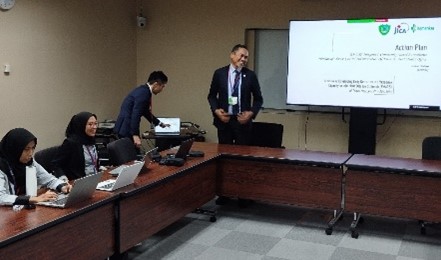
Mr. Hasan’s presentation of the action plan as an output of the training on the last day (June 21, 2024).
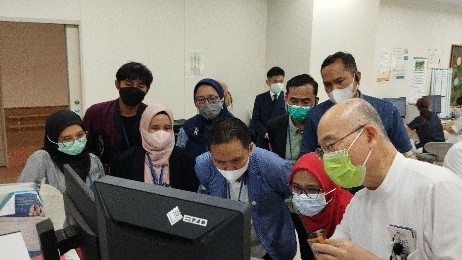
Explanation of surveillance activities by Dr. Taniguchi at Mie National Hospital (June 11, 2024).
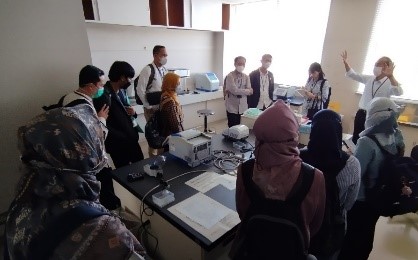
Tsu Public Health Center laboratory in Mie Prefecture (June 12, 2024).
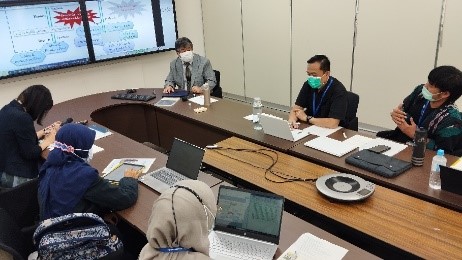
Lecture by Dr. Kuwabara at the Hiroshima CDC (June 14, 2024).
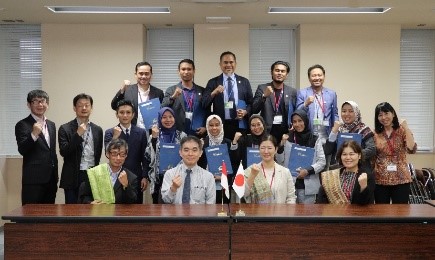
Closing ceremony with a certificate of completion in the NIID (June 21, 2024).
scroll